实验3 C语言函数应用编程
实验任务1
#include <stdio.h>
#include <stdlib.h>
#include <time.h>
#include <windows.h>
#define N 80
void print_text(int line, int col, char text[]); // 函数声明
void print_spaces(int n); // 函数声明
void print_blank_lines(int n); // 函数声明
int main() {
int line, col, i;
char text[N] = "hi, April~";
srand(time(0)); // 以当前系统时间作为随机种子
for(i = 1; i <= 10; ++i) {
line = rand() % 25;
col = rand() % 80;
print_text(line, col, text);
Sleep(1000); // 暂停1000ms
}
return 0;
}
// 打印n个空格
void print_spaces(int n) {
int i;
for(i = 1; i <= n; ++i)
printf(" ");
}
// 打印n行空白行
void print_blank_lines(int n) {
int i;
for(i = 1; i <= n; ++i)
printf("\n");
}
// 在第line行第col列打印一段文本
void print_text(int line, int col, char text[]) {
print_blank_lines(line-1); // 打印(line-1)行空行
print_spaces(col-1); // 打印(col-1)列空格
printf("%s", text); // 在第line行、col列输出text中字符串
}
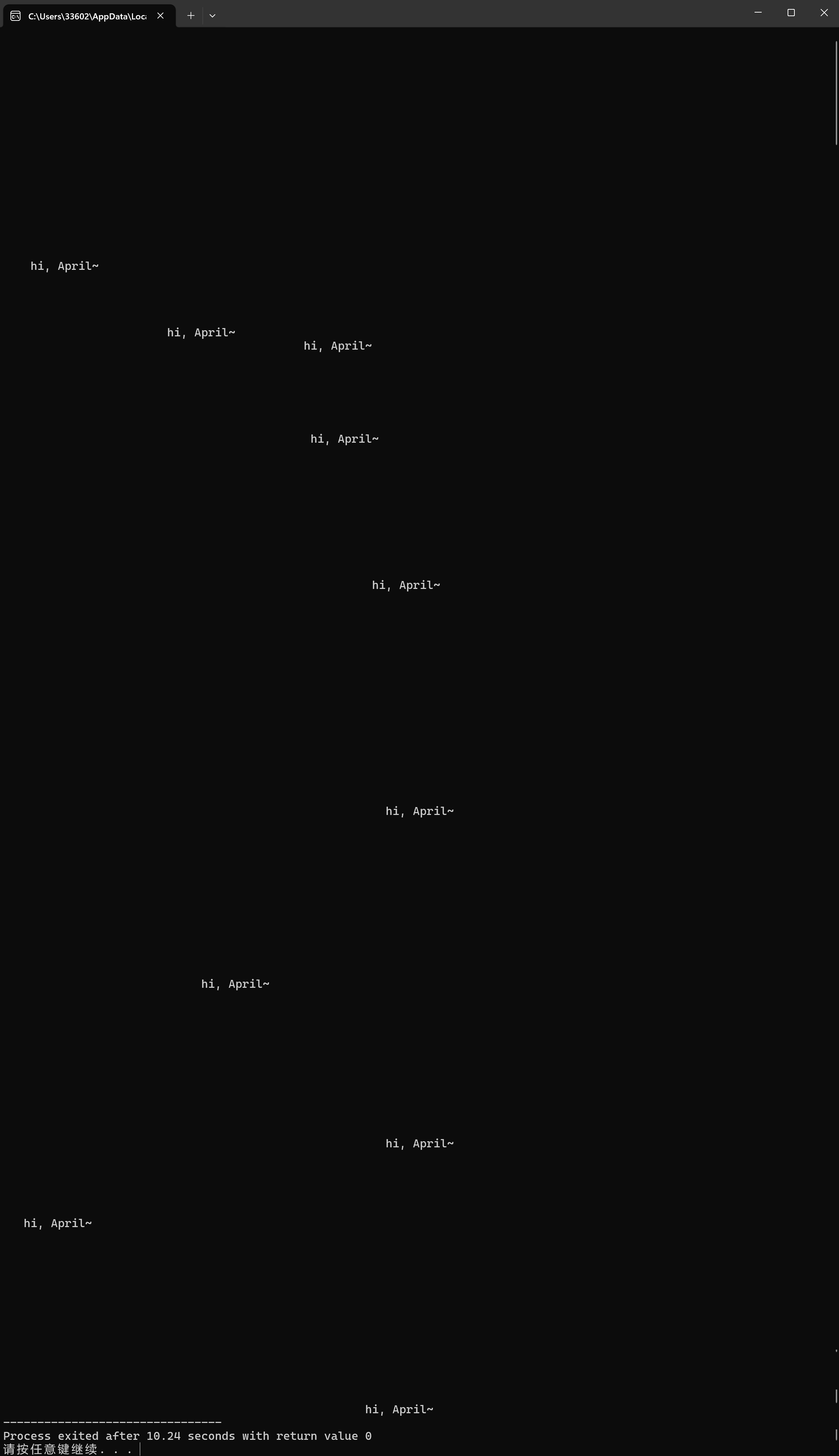
功能:在屏幕上随机位置打印十个“hi,April~”
实验任务2
task2.1
#include <stdio.h>
long long fac(int n); // 函数声明
int main() {
int i, n;
printf("Enter n: ");
scanf("%d", &n);
for (i = 1; i <= n; ++i)
printf("%d! = %lld\n", i, fac(i));
return 0;
}
// 函数定义
long long fac(int n) {
static long long p = 1;
p = p * n;
return p;
}
增加一行代码后的结果

task2.2
#include <stdio.h>
int func(int, int); // 函数声明
int main() {
int k = 4, m = 1, p1, p2;
p1 = func(k, m); // 函数调用
p2 = func(k, m); // 函数调用
printf("%d, %d\n", p1, p2);
return 0;
}
// 函数定义
int func(int a, int b) {
static int m = 0, i = 2;
i += m + 1;
m = i + a + b;
return m;
}

局部static变量:只进行一次初始化,后续计算用上一次计算得出的结果
实验任务3
#include <stdio.h>
long long func(int n); // 函数声明
int main() {
int n;
long long f;
while (scanf("%d", &n) != EOF) {
f = func(n); // 函数调用
printf("n = %d, f = %lld\n", n, f);
}
return 0;
}
long long func(int n)
{
long long w;
if(n==0)
w=0;
else
w=2*func(n-1)+1;
return w;
}
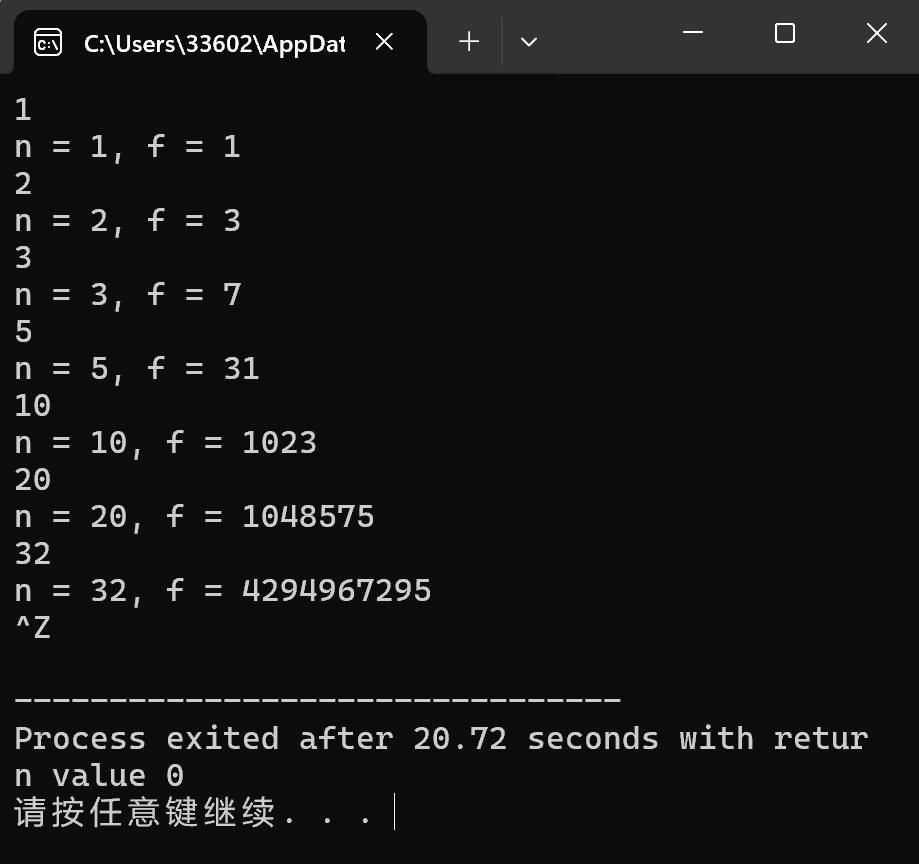
实验任务4
task4.1 迭代法
#include <stdio.h>
int func(int n, int m);
int main() {
int n, m;
while(scanf("%d%d", &n, &m) != EOF)
printf("n = %d, m = %d, ans = %d\n", n, m, func(n, m));
return 0;
}
// 函数定义
// 待补足。。。
int func(int n,int m)
{
int i;
double down=m,up=n,s;
if(m==0)
s=1;
else
{
for(i=1;i<=m-1;i++)
{
up=up*(up-i);
down=down*(down-i);
}
s=up/down;
}
return s;
}
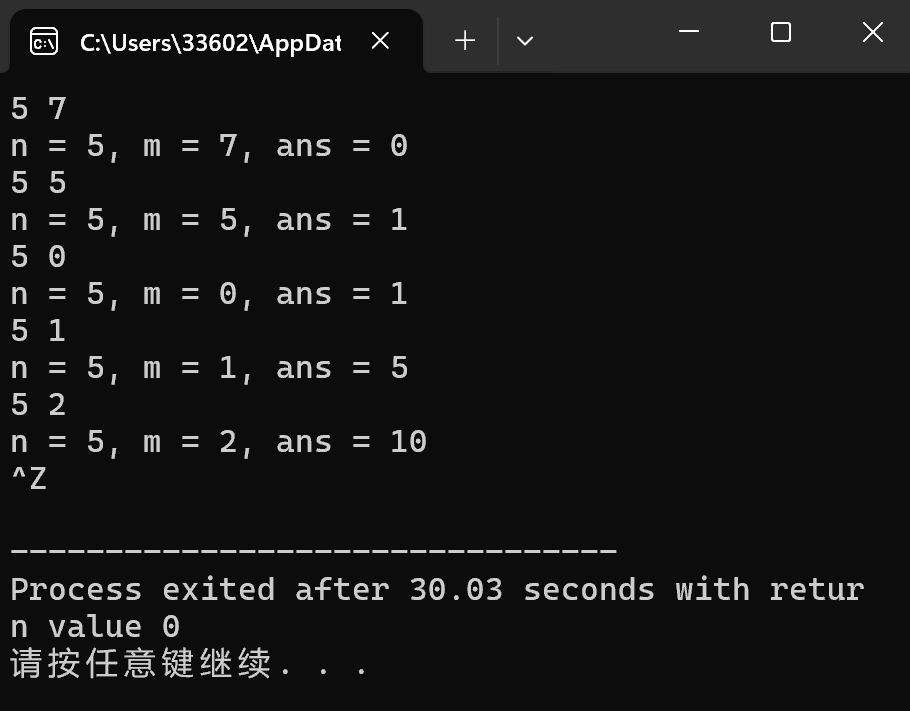
task4.2 递归法
#include <stdio.h>
int func(int n, int m);
int main() {
int n, m;
while(scanf("%d%d", &n, &m) != EOF)
printf("n = %d, m = %d, ans = %d\n", n, m, func(n, m));
return 0;
}
// 函数定义
// 待补足。。。
int func(int n,int m)
{
if(m==n||m==0)
return 1;
if(n<m)
return 0;
else
{
int s;
s=func(n-1,m)+func(n-1,m-1);
return s;
}
}
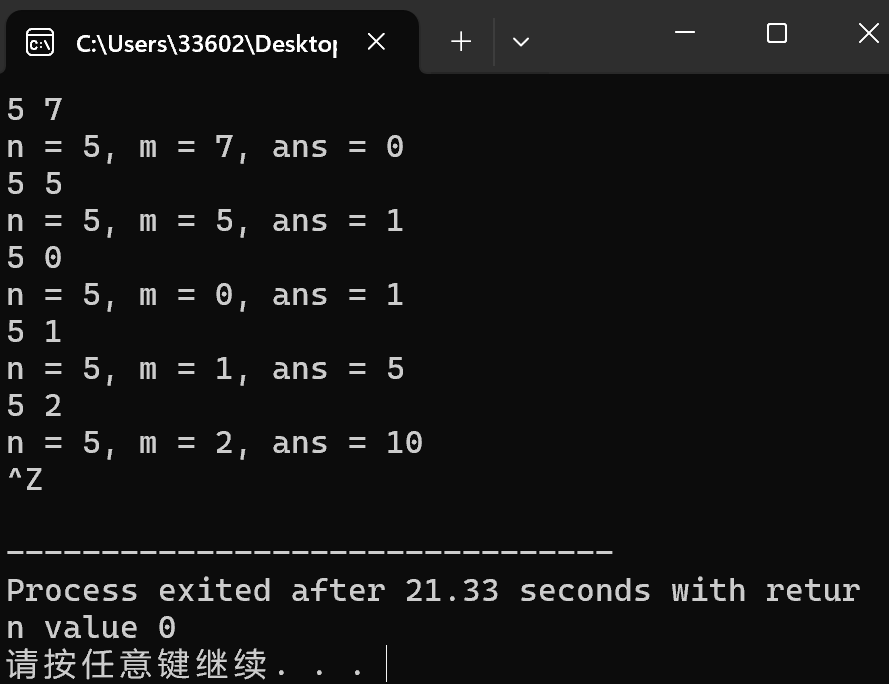
实验任务5
#include<stdio.h>
#include<stdlib.h>
#include<math.h>
void hanoi(unsigned int n,char from,char temp,char to);
void moveplate(unsigned int n,char from,char to);
int main()
{
unsigned int n;
int s;
while(scanf("%d",&n)!=EOF)
{
hanoi(n,'A','B','C');
s=pow(2,n)-1;
printf("一共移动了%d次\n",s);
}
system("pause");
return 0;
}
void hanoi(unsigned int n,char from,char temp,char to)
{
if(n==1)
moveplate(n,from,to);
else
{
hanoi(n-1,from,to,temp);
moveplate(n,from,to);
hanoi(n-1,temp,from,to);
}
}
void moveplate(unsigned int n,char from,char to)
{
printf("%d:%c-->%c\n",n,from,to);
}
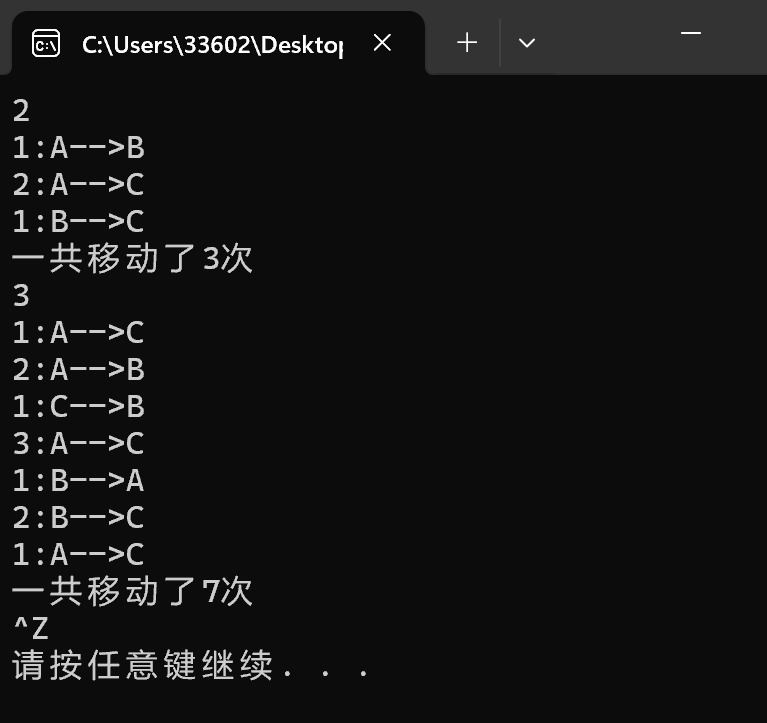
实验任务6
#include <stdio.h>
#include <math.h>
long func(long s); // 函数声明
int main() {
long s, t;
printf("Enter a number: ");
while (scanf("%ld", &s) != EOF) {
t = func(s); // 函数调用
printf("new number is: %ld\n\n", t);
printf("Enter a number: ");
}
return 0;
}
// 函数定义
// 待补足。。。
long func(long s)
{
int m,t=1;
long ans=0;
while(s!=0)
{
m=s%10;
if(m%2!=0)
{
ans=ans+t*m;
t=t*10;
}
s=s/10;
}
return ans;
}



 浙公网安备 33010602011771号
浙公网安备 33010602011771号